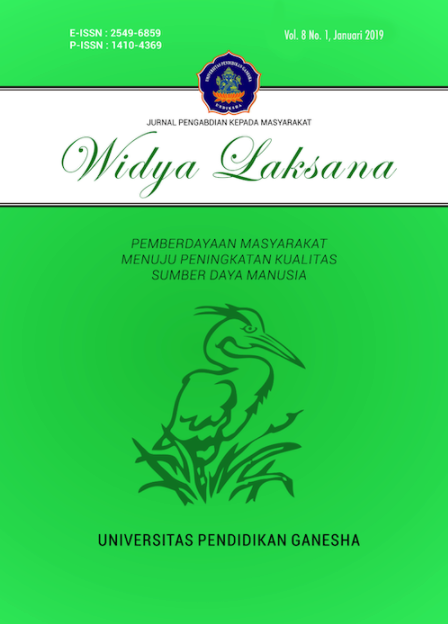Pelatihan dan Pendampingan Proses Pembuatan Regulasi Desa di Desa Bonyoh Kecamatan Kintamani
DOI:
https://doi.org/10.23887/jwl.v9i2.27689Abstract
The main objective of the Training and Assistance for village development in Bonyoh, Kintamani Subdistrict is to (1) increase the knowledge and skills of the village head, village apparatus and the Village Consultative Body in making Village Regulations, (2) improve the knowledge and skills of the village head, village apparatus and the Agency Village Consultation in making Village Head Regulations, and (3) improving the knowledge and skills of village heads, village officials and the Village Consultative Body in making Joint Village Head Regulations.Training and Assistance for Making Village Regulation in Bonyoh Village, Kintamani District will be conducted using two synergistic-based methods, namely: training methods and mentoring methods. This training and assistance in making village regulations increases the knowledge and skills of the Village Head and the Village Consultative Body in making village regulations, village head regulations and regulations with village heads. The stages of making village regulations begin with the making of village regulations making, the drafting of village regulations by the Village Head or the Village Consultative Body, then a joint discussion is held between the village head and the Village Consultative Body, the establishment of village regulations, the dissemination of village complaints and discussion of the village.
References
Rahmawati, (2015) Analisis Kesiapan Desa Dalam Implementasi Penerapan UU Nomor 6 Tahun 2014 Tentang Desa (Studi Pada Delapan Desa Di Kabupaten Sleman). The 2nd University Research Coloquium 2015.
Suastika, (2017) Village Enterprises (a Case Study Of Rural Enterprise-Based Social Capital At The Purwakerti Village Community). South East Asia Journal Of Contemporary Business, Economics And Law, Vol. 12, Issue 4 (April) 2017.
Sukadi, (2015) Pelatihan dan Pendampingan Badan Usaha Desa Berbasi Tri Hita Karana Di Desa Purwakerti Kabupaten Karangasem. Laporan Pengabdian Pada Masyarakat. Singaraja: Universitas Pendidikan Ganesha.
Undang-Undang Nomor 6 Tahun 2014 tentang Desa (Lembaran Negara Republik Indonesia Tahun 2014 Nomor 7, Tambahan Lembara Negara Republik Indonesia Nomor 5495).
Undang-Undang Nomor 23 Tahun 2014 tentang Pemerintahan Daerah (Lembaran Negara Republik Indonesia Tahun 2014 Nomor 244, Tambahan Lembaran Negara Republik Indonesia Nomor 5587) sebagaimana telah beberapa kali diubah terakhir dengan Undang-Undang Nomor 9 Tahun 2015 tetang Perubahan Kedua atas Undang-Undang Nomor 23 Tahun 2014 tentang Pemerintahan Daerah (Lembaran Negara Republik Indonesia Tahun 2015 Nomor 58, Tambahan Lembaran Negara Republik Indonesia 5679).
Undang-Undang Nomor 12 Tahun 2011 tentang Pembentukan Peraturan Perundang-undangan (Lembaran Negara Republik Indonesia Tahun 2011)
Peraturan Pemerintah Nomor 43 Tahun 2014 tentang Peraturan Pelaksanaan Undang-Undang Nomor 6 Tahun 2014 tentang Desa.
Peraturan Pemerintah Nomor 71 Tahun 2005 tentang Desa
Permendagri Nomor 111 Tahun 2014 Tentang Pedoman Teknis Peraturan Di Desa . Jakarta Kementrian Dalam Negeri.
Wijayanto, (2014) Kepala Desa Dengan Badan Permusyawaratan Desa Dalam Pembentukan Peraturan Desa. Jurnal Independent Vol. 2 No. 1 Tahun 2014.
Widodo, dkk (2020) Relasi Kekuasaan Antar Presiden dan Wakil Presiden dalam Sistem Ketatanegaraan Republik Indonesia. Jurnal Pandecta Vol. 15 No. 1 Juni 2020.
Zakaria, F dan Suprihardjo, R (2014) Konsep Pengembangan Kawasan Desa Wisata di Desa Bandungan Kecamatan Pakong Kabupaten Pamekasan. Jurnal Teknik ITS Vol. 3 No. 2 tahun 2014.
Downloads
Published
Issue
Section
License
Authors who publish with the Widya Laksana agree to the following terms:- Authors retain copyright and grant the journal the right of first publication with the work simultaneously licensed under a Creative Commons Attribution License (CC BY-SA 4.0) that allows others to share the work with an acknowledgment of the work's authorship and initial publication in this journal
- Authors are able to enter into separate, additional contractual arrangements for the non-exclusive distribution of the journal's published version of the work (e.g., post it to an institutional repository or publish it in a book), with an acknowledgment of its initial publication in this journal.
- Authors are permitted and encouraged to post their work online (e.g., in institutional repositories or on their website) prior to and during the submission process, as it can lead to productive exchanges, as well as earlier and greater citation of published work. (See The Effect of Open Access)



